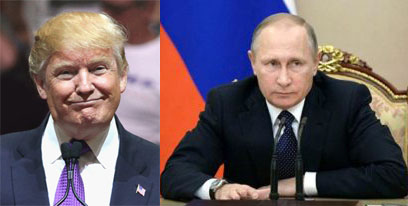A nation must think before it acts.
Donald Trump’s Russia strategy is based on making a series of one-sided concessions in the hopes of luring Moscow into a more positive global relationship. There’s a name for this approach: appeasement. A man who ran for office as the ultimate negotiator is intent on giving away the store on Crimea and Syria for free—and it’s unlikely to reap much of a dividend.
Appeasement is a pejorative phrase because of the association with appeasing Hitler in the 1930s. Indeed, making unilateral concessions to aggressive dictators in the hope of satiating their appetite is unlikely to work. But appeasement can actually be effective when leaders are dealing with a regime that has defensive goals and reasonable grievances. Accommodating a rival’s gripes could potentially convert an enemy into a friend. For example, in the late 19th century, Britain decided that a rising Germany was more of a threat than the United States, and chose to appease Washington on a range of issues in the Western Hemisphere. As a result, Anglo-American relations entered smoother waters and the two countries became allies in the world wars. Is Russia a good candidate for appeasement?
In 2014, following the toppling of a pro-Russian regime in Ukraine, Russian forces seized control of the Ukrainian province of Crimea, held a referendum of dubious legitimacy to determine control (which found widespread support for incorporation into Russia), and then promptly annexed the territory. In response, Western states imposed sanctions on Russian banks and corporations that Putin admitted have hurt the Russian economy.
Putin craves international recognition of Russian Crimea and the lifting of sanctions. Only eight countries currently recognize Moscow’s annexation, and it’s an awkward squad of leftist Latin American regimes (Bolivia, Cuba, Nicaragua, Venezuela), a founding member of the “Axis of Evil” (North Korea), a regime whose leader has been indicted by the International Criminal Court for crimes against humanity and war crimes (Sudan), an African country facing economic collapse (Zimbabwe), and an embattled ally that has murdered thousands of its own citizens (Syria). Moscow desperately needs a few respectable countries to accept the new status of Crimea. The ultimate prize would be U.S. recognition because of Washington’s global power and the possibility of inducing American allies to follow suit.




